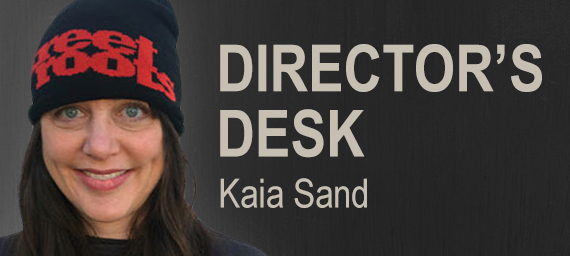On Oct. 21, Mayor Ted Wheeler and Commissioner Dan Ryan proposed “a citywide ban on self-sited unsanctioned encampments coupled with designated alternative camping sites.” This camping ban, scheduled to go to a vote this Thursday, Nov. 3, does not exist in a vacuum. The city of Portland has promoted, and been challenged on, restrictions that are both about camping (camping bans) and sitting and lying down on sidewalks (sit-lie ordinances). The following is a brief quarter century of political, legal and direct action history of these ordinances and bans in Portland. Through its advocacy wing, Street Roots has been involved in this history, helping found Dignity Village as well as the Western Regional Advocacy Project.
Direct actions
Many groups have created direct-action camps, often on the edge of city hall. The Out of the Doorways campaign staged a camp beneath the Morrison Bridge that transformed into Dignity Village in 2000. The Portland Peace Camp began as an anti-war camp the day the United States invaded Iraq on March 19, 2003, but, as the city began to deploy sweeps on that camp, it transformed into a protest against sit-lie ordinances. That same year, Street Roots organized a three-day sit-lie festival to protest the city’s sit-lie ordinances in which two of its writers were arrested. In May 2008, a group of more than 100 people camped outside city hall to protest the sit-lie ordinances. While organizers of Right 2 Dream Too set up on private land, the city fined it for infractions such as the height of its fence. R2DToo sued the city, ultimately arriving at a settlement. In 2009, long-time organizer Art Rios led another city hall encampment. Right 2 Surve ran its Pitch a Tent camping action during the Rose Festival from 2010-2019, an action in the lineage of the late 1990s “ticketing” by the Campaign for Safe Sleep. Cameron Whitten launched a 55-day hunger strike in 2012, fighting for eviction relief, housing and the cancellation of fines the city levied against Right 2 Dream Too. Houseless organizers took over land in the Overlook neighborhood to build Hazelnut Village in 2015, as well as the short-lived Village of Hope in 2018 and St. Johns Landing during the pandemic years. Stop the Sweeps has staged actions in recent years.
The Homeless Bill of Rights
Western Regional Action Project co-founders, Right 2 Survive, Sisters of the Road and Street Roots — working with the ACLU of Oregon — have promoted a Homeless Bill of Rights over the past decade, which has been introduced in the Oregon Legislature multiple times as the Right to Rest Act, most recently in 2021.
Campaign for Legal Places to Sleep
In the late 1990s, the Campaign for Legal Places to Sleep, of which Burnside Cadillac and then Street Roots were a part, led a direct-action campaign against the city's anti-camping ordinance. In Oct. 2000, a Multnomah County judge overturned the city’s 19-year-old anti-camping ordinance.
Sit-lie ordinances
With the camping ban overturned, Mayor Katz announced new enforcement guidelines for the city’s “Obstruction as Nuisances” ordinance in 2002, banning individuals from sitting or lying on a public sidewalk. Violation of the code was a class B misdemeanor, punishable with jail time and a $500 fine. Sit-lie ordinances were battled on the streets and in courts for years. It was declared unconstitutional by Circuit Court Judge Marilyn E. Litzenberger in 2004 and Judge Stephen K. Bushong in 2009.
The Anderson Agreement
The Oregon Law Center settled a class action lawsuit against the city of Portland in 2012, leading to the Anderson Agreement, which established notice to individuals before citing them for camping or removing campers’ belongings from public property and setting specific procedures for campers to reclaim confiscated belongings. Street Roots vendor and board member Leo Rhodes was one of the plaintiffs. An inter-governmental agreement in 2018 brought Oregon Department of Transportation property within Portland under City of Portland guidelines.
Martin V. Boise
In 2019, the 9th Circuit Appeal Court in Portland upheld Martin v. Boise, which declares “ordinances that criminalize sleeping, sitting, or lying in all public spaces when no alternative sleeping space is available” as violating the Eighth Amendment on cruel and unusual punishment. The states and territories in the 9th circuit include Alaska, California, Guam, Hawai'i, Idaho, Montana, Nevada, Northern Mariana Islands, Oregon and Washington.
The Oregon Justice Resource Center and Underdog Law sued the city in 2021 for throwing away campers’ possessions, settling in 2022 with clarification of storage policies.
Street Roots is an award-winning weekly investigative publication covering economic, environmental and social inequity. The newspaper is sold in Portland, Oregon, by people experiencing homelessness and/or extreme poverty as means of earning an income with dignity. Street Roots newspaper operates independently of Street Roots advocacy and is a part of the Street Roots organization. Learn more about Street Roots. Support your community newspaper by making a one-time or recurring gift today.
© 2022 Street Roots. All rights reserved. | To request permission to reuse content, email editor@streetroots.org or call 503-228-5657, ext. 404



